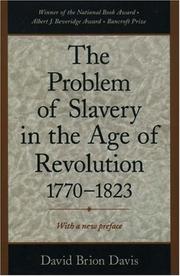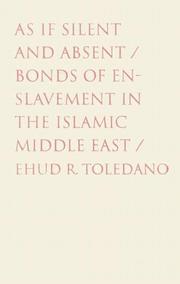| Listing 1 - 10 of 341 | << page >> |
Sort by
|
Book
ISBN: 0226326470 Year: 1982 Publisher: Chicago (Ill.): University of Chicago press
Abstract | Keywords | Export | Availability | Bookmark
 Loading...
Loading...Choose an application
- Reference Manager
- EndNote
- RefWorks (Direct export to RefWorks)
Slavery --- -Abolition of slavery --- Antislavery --- Enslavement --- Mui tsai --- Ownership of slaves --- Servitude --- Slave keeping --- Slave system --- Slaveholding --- Thralldom --- Crimes against humanity --- Serfdom --- Slaveholders --- Slaves --- History --- -History --- Abolition of slavery --- Enslaved persons
Book
ISBN: 3430195179 Year: 1981 Publisher: Düsseldorf Econ
Abstract | Keywords | Export | Availability | Bookmark
 Loading...
Loading...Choose an application
- Reference Manager
- EndNote
- RefWorks (Direct export to RefWorks)
Slavery --- -Slavery --- -Abolition of slavery --- Antislavery --- Enslavement --- Mui tsai --- Ownership of slaves --- Servitude --- Slave keeping --- Slave system --- Slaveholding --- Thralldom --- Crimes against humanity --- Serfdom --- Slaveholders --- Slaves --- History --- History. --- -History

ISBN: 0195128508 1280471883 0198029497 1602563403 9781602563407 9780198029496 9780195126716 0195126718 9781280471889 0195126718 0199880832 0197715583 9786610471881 6610471886 9780199880836 9780195128505 Year: 2023 Publisher: New York ; Oxford Universtiy Press,
Abstract | Keywords | Export | Availability | Bookmark
 Loading...
Loading...Choose an application
- Reference Manager
- EndNote
- RefWorks (Direct export to RefWorks)
Part of a trilogy "The Problem of Slavery in World History", this is the second book in the series. It features a preface exploring the anti-slavery debate among American historians, between the 1970s and 1990s, started by the original publication of this book in the 1970s.
Slavery. --- Slavery --- Abolition of slavery --- Antislavery --- Enslavement --- Mui tsai --- Ownership of slaves --- Servitude --- Slave keeping --- Slave system --- Slaveholding --- Thralldom --- Crimes against humanity --- Serfdom --- Slaveholders --- Slaves --- History. --- Enslaved persons

ISBN: 1281735388 9786611735388 0300137966 9780300137965 9781281735386 9780300114614 0300114613 9780300126181 0300126182 6611735380 Year: 2007 Publisher: New Haven Yale University Press
Abstract | Keywords | Export | Availability | Bookmark
 Loading...
Loading...Choose an application
- Reference Manager
- EndNote
- RefWorks (Direct export to RefWorks)
This groundbreaking book reconceptualizes slavery through the voices of enslaved persons themselves, voices that have remained silent in the narratives of conventional history. Focusing in particular on the Islamic Middle East from the late eighteenth to the early twentieth century, Ehud R. Toledano examines how bonded persons experienced enslavement in Ottoman societies. He draws on court records and a variety of other unexamined primary sources to uncover important new information about the Africans and Circassians who were forcibly removed from their own societies and transplanted to Middle East cultures that were alien to them. Toledano also considers the experiences of these enslaved people within the context of the global history of slavery.The book looks at the bonds of slavery from an original perspective, moving away from the traditional master/slave domination paradigm toward the point of view of the enslaved and their responses to their plight. With keen and original insights, Toledano suggests new ways of thinking about enslavement.
Slavery --- Abolition of slavery --- Antislavery --- Enslavement --- Mui tsai --- Ownership of slaves --- Servitude --- Slave keeping --- Slave system --- Slaveholding --- Thralldom --- Crimes against humanity --- Serfdom --- Slaveholders --- Slaves --- History. --- Enslaved persons
Book
ISBN: 1469602660 0807877670 9780807877678 9781469602660 9780807832189 0807832189 9780807871942 080787194X 9798893131772 Year: 2011 Publisher: Chapel Hill, N.C. : University of North Carolina Press,
Abstract | Keywords | Export | Availability | Bookmark
 Loading...
Loading...Choose an application
- Reference Manager
- EndNote
- RefWorks (Direct export to RefWorks)
Putting the voices of the enslaved front and center, Gloria Garcia Rodriguez's study presents a compelling overview of African slavery in Cuba and its relationship to the plantation system that was the economic center of the New World. A major essay by Garcia, who has done decades of archival research on Cuban slavery, introduces the work, providing a history of the development, maintenance, and economy of the slave system in Cuba, which was abolished in 1886, later than in any country in the Americas except Brazil. The second part of the book features eighty previously unpublished primary doc
Slavery --- Abolition of slavery --- Antislavery --- Enslavement --- Mui tsai --- Ownership of slaves --- Servitude --- Slave keeping --- Slave system --- Slaveholding --- Thralldom --- Crimes against humanity --- Serfdom --- Slaveholders --- Slaves --- History --- Enslaved persons

ISBN: 0826260071 9780826260079 0826212271 9780826212276 Year: 1999 Publisher: Columbia, Mo. University of Missouri Press
Abstract | Keywords | Export | Availability | Bookmark
 Loading...
Loading...Choose an application
- Reference Manager
- EndNote
- RefWorks (Direct export to RefWorks)
Slavery --- Abolition of slavery --- Antislavery --- Enslavement --- Mui tsai --- Ownership of slaves --- Servitude --- Slave keeping --- Slave system --- Slaveholding --- Thralldom --- Crimes against humanity --- Serfdom --- Slaveholders --- Slaves --- Bermuda Islands --- Enslaved persons
Book
ISBN: 0804783756 9780804783750 9780804782333 0804782334 Year: 2012 Publisher: Palo Alto Stanford University Press
Abstract | Keywords | Export | Availability | Bookmark
 Loading...
Loading...Choose an application
- Reference Manager
- EndNote
- RefWorks (Direct export to RefWorks)
In the late nineteenth century, an active slave trade sustained social and economic networks across the Ottoman Empire and throughout Egypt, Sudan, the Caucasus, and Western Europe. Unlike the Atlantic trade, slavery in this region crossed and mixed racial and ethnic lines. Fair-skinned Circassian men and women were as vulnerable to enslavement in the Nile Valley as were teenagers from Sudan or Ethiopia.Tell This in My Memory opens up a new window in the study of slavery in the modern Middle East, taking up personal narratives of slaves and slave owners to shed light on the
Slavery --- Slaves --- Enslaved persons --- Persons --- Abolition of slavery --- Antislavery --- Enslavement --- Mui tsai --- Ownership of slaves --- Servitude --- Slave keeping --- Slave system --- Slaveholding --- Thralldom --- Crimes against humanity --- Serfdom --- Slaveholders --- History
Book
ISBN: 1443838098 9781443838092 1299658970 9781299658974 1443837369 9781443837361 Year: 2012 Publisher: Newcastle upon Tyne, UK Cambridge Scholars Publishing
Abstract | Keywords | Export | Availability | Bookmark
 Loading...
Loading...Choose an application
- Reference Manager
- EndNote
- RefWorks (Direct export to RefWorks)
Slaves have never been mere passive victims of slavery. Typically, they have responded with ingenuity to their violent separation from their native societies, using a variety of strategies to create new social networks and cultures. Religion has been a ma
Slavery --- Abolition of slavery --- Antislavery --- Enslavement --- Mui tsai --- Ownership of slaves --- Servitude --- Slave keeping --- Slave system --- Slaveholding --- Thralldom --- Crimes against humanity --- Serfdom --- Slaveholders --- Slaves --- Religious aspects. --- Enslaved persons
Book
ISBN: 1282602993 9786612602993 9047429966 9789047429968 9781282602991 9789004158610 9004158618 6612602996 Year: 2008 Publisher: Leiden Boston Martinus Nijhoff Publishers
Abstract | Keywords | Export | Availability | Bookmark
 Loading...
Loading...Choose an application
- Reference Manager
- EndNote
- RefWorks (Direct export to RefWorks)
Slavery has taken on added significance in the twenty-first century as a result of its inclusion in the Statute of the International Criminal Court and it being a component part of the 2001 UN and 2005 Council of Europe conventions against trafficking. With limited and conflicting case-law on the issue, the compiling of the Travaux Préparatoires of the 1926 League of Nations and the 1956 United Nations conventions become essential in seeking to holding States or individuals responsible for violations of international law touching on slavery. The Travaux Préparatoires of the slavery conventions provide insights into the definitions of slavery, the slave trade, and various types of servile statuses while revealing information regarding the various obligations that States have undertaken to suppress the various manifestations of human exploitation.
Slavery --- Abolition of slavery --- Antislavery --- Enslavement --- Mui tsai --- Ownership of slaves --- Servitude --- Slave keeping --- Slave system --- Slaveholding --- Thralldom --- Crimes against humanity --- Serfdom --- Slaveholders --- Slaves --- Legislative history. --- Convention on the abolition of slavery, the slave trade, and institutions and practices similar to slavery. --- Slavery Convention --- Convention Between the United States and Other Powers to Supress the Slave Trade and Slavery --- Convention relative à l'esclavage --- International convention with the object of securing the abolition of slavery and the slave trade --- International Slavery Convention --- Enslaved persons --- Law and legislation --- Convention on the Abolition of Slavery, the Slave Trade, and Institutions and Practices Similar to Slavery
Book
ISBN: 9004346619 9789004346611 9789004346543 9004346546 Year: 2018 Publisher: Leiden Boston
Abstract | Keywords | Export | Availability | Bookmark
 Loading...
Loading...Choose an application
- Reference Manager
- EndNote
- RefWorks (Direct export to RefWorks)
The study of slavery has grown strongly in recent years, as scholars working in several disciplines have cultivated broader perspectives on enslavement in a wide variety of contexts and settings. Critical Readings on Global Slavery offers students and researchers a rich collection of previously published works by some of the most preeminent scholars in the field. With contributions covering various regions and time periods, this anthology encourages readers to view slave systems across time and space as both ubiquitous and interconnected, and introduces those who are interested in the study of human bondage to some of the most important and widely cited works in slavery studies.
Slavery. --- Abolition of slavery --- Antislavery --- Enslavement --- Mui tsai --- Ownership of slaves --- Servitude --- Slave keeping --- Slave system --- Slaveholding --- Thralldom --- Crimes against humanity --- Serfdom --- Slaveholders --- Slaves --- Enslaved persons
| Listing 1 - 10 of 341 | << page >> |
Sort by
|

 Search
Search Feedback
Feedback About UniCat
About UniCat  Help
Help News
News